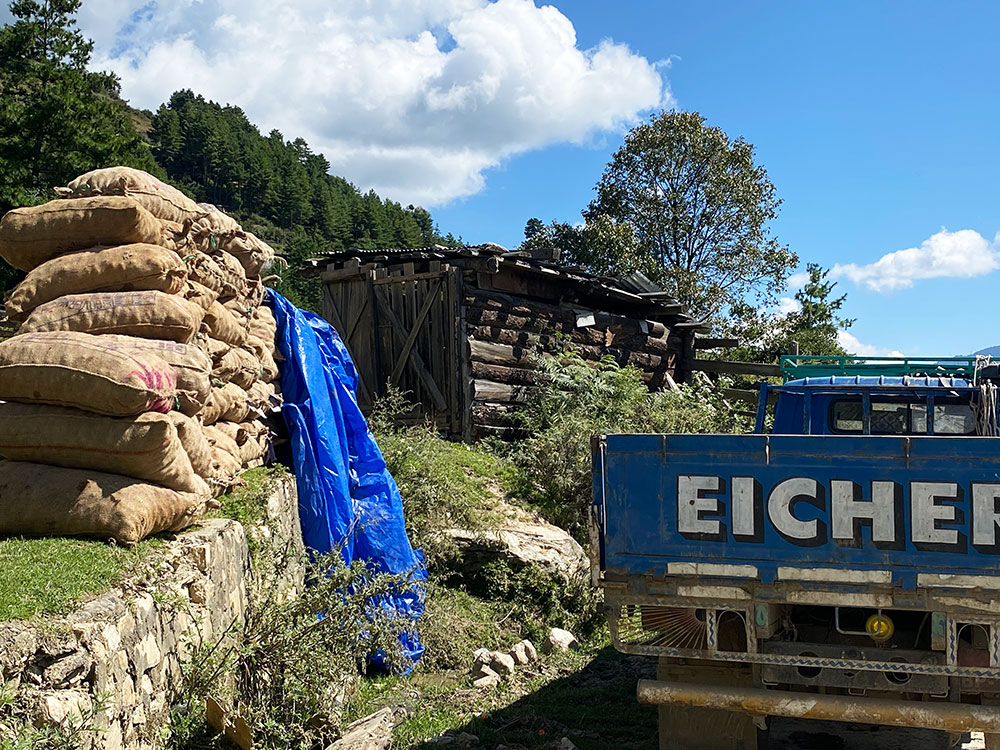Phub Dem | Paro
Farmers in Haa and Paro are unhappy with the price of potatoes and the buyback procedures.
After fetching a good price for potatoes last year, farmers doubled their cultivation this year, but farmers have had to take the produce to Food Corporation of Bhutan’s (FCB) collection point near Dogar gewog centre because private vendors could not facilitate the sale of the produce.
Farmer Rinzin from Shari village of Samar gewog in Haa said he could sell only 20 bags as seed potatoes to his neighbours. “The buyback scheme was effective, but it was not consistent.”
He said it was getting challenging to store the vegetables safely from the frost and cold.
Having earned a significant amount from last year’s sale of potatoes, Rinzin doubled his production this time, but the price was low and farmers had to bear the transportation charges to transport the produce to the collection centre.
“Last year, I fetched Nu 2,100 a bag. The private vendors collected them from our doorstep. It is difficult this time,” he said.
Rinzin said the government should provide a storage place for the potatoes, as farmers do not have a proper place to store and protect the potatoes from rats and sprouting.
Most farmers in Haa and Paro depend solely on potatoes as their annual source of income.
Another farmer from Naja, Sangay, said that it was challenging to meet expenditures such as transportation and labour charges from the amount earned from the sale.
He said farmers had to load and unload the produce thrice before it was shipped to Phuentsholing. “Besides, farmers have to re-segregate the potatoes into four sizes according to the FCB’s requirement. Having to redo all these things is a hassle to the farmers.”
According to the FCB’s zonal coordinator for Haa and Paro, Pema Dorji, the collection of the potatoes was suspended for three days as the vehicle ferrying the produce was jammed at the FCB’s depot.
He said they had to take a three-day gap, as potatoes from four dzongkhags congest the space and overwhelm the labourers at the depot.
According to the official, although there were no problems in exporting the produce, delays in sending vehicles from Indian counterparts and limited space to stock the goods was hampering the collection process.
He said vehicles were jammed at the depot as potatoes from Haa, Paro, Thimphu, Chukha, Wangdue, and Bumthang had reached the depot at the same time.
Pema Dorji said while FCB officials had been at the site to facilitate the sale of potatoes since July of this year, farmers waited until the last minute for the price to increase.
He also said high production of potatoes in India impacted the export, as private vendors were unwilling to facilitate the trade due to lower prices. “The government had to buy back the produce.”
According to him, the price of the potatoes kept fluctuating. “A few months ago, farmers sold most of their produce to private vendors and did not sell even a bag to the FCB due to price differences. We began the collection only through the buyback scheme on December 4.”
Pema Dorji said that farmers from Genekha, Pangbisa, Haa, and Paro had to bring their vegetables to the collection point, and farmers were well aware and informed about the process. “The price of buyback potatoes is as per the directives of the Ministry of Finance.”
Ideally, farmers should complete the export by November, but they waited until the price increased like last year, which increased to Nu 2,300 per bag. This time, farmers fetched around Nu 1,750 per bag.
The FCB is buying at Nu 21 per kilogramme of big grade, Nu 19 for medium, Nu 17 for small and Nu 12 for marble size.
Meanwhile, Pema Dorji said that except for a few truckloads from Haa and Paro, the FCB already collected about 60 percent of the potatoes through the scheme.


